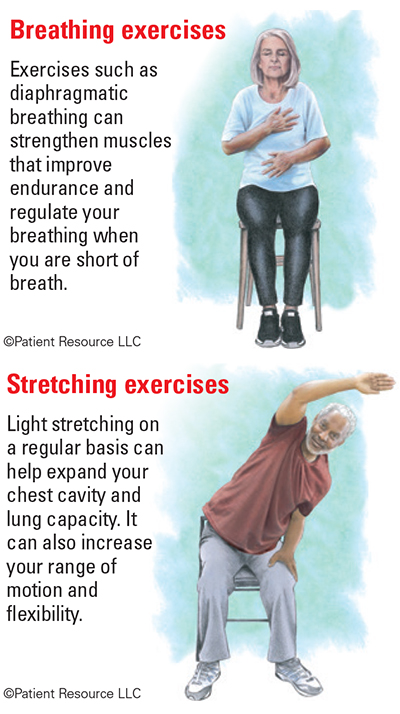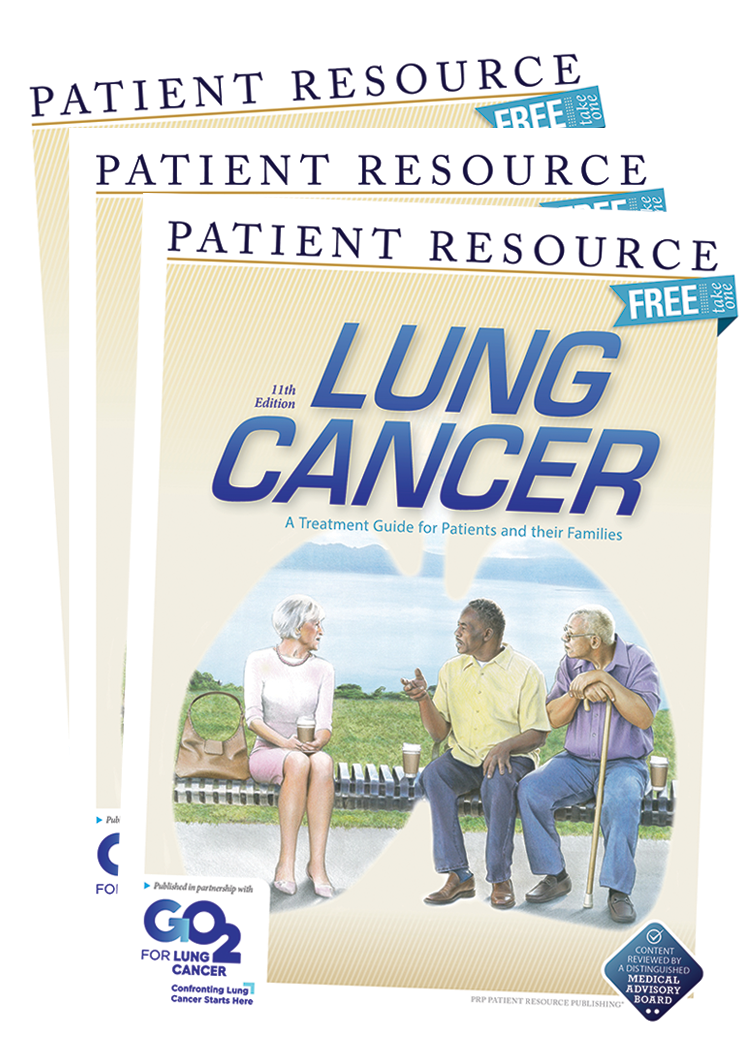Lung Cancer
Healthy Living
Trying to “stay healthy” after receiving a lung cancer diagnosis may sound a little odd until you realize what it means and what a difference it makes. Your daily habits have a direct effect on how you feel physically and emotionally, and they can even influence the effectiveness of your treatment. At a time when many things feel out of your control, make the decision to maintain your quality of life by leading a healthy lifestyle.
Create a Nutrition Plan
Many things about your daily diet will change once you begin cancer treatment, so it helps to have a plan and resources. For example, your nutritional needs may increase, but you may also lose your appetite, making it feel impossible to give your body the fuel it needs to keep up your strength. You will
also be at risk for dehydration, a common side effect from certain treatments that can be dangerous and even life-threatening. A registered dietitian can help you understand how to get plenty of fluids and follow a nutritious, well-balanced diet.
Exercises for people with lung cancer

Exercise the Right Way
Exercise does not have to mean running a marathon or even breaking a sweat. It may include taking a short walk, getting the mail or doing low-impact stretching. Your goals should be to avoid inactivity and do something every day. Daily exercise can help maintain muscle, reduce fatigue and improve your emotional well-being. Talk with your doctor about the right type of exercise for you.
Reduce the Stress on Your Lungs
Your lungs are vulnerable to further damage and discomfort, such as wheezing and shortness of breath, caused by inflammation from environmental sources. So, while your treatment plan focuses on eliminating or managing the cancer, you can do the following:
- Practice breathing exercises to strengthen muscles used to breathe.
- Stop smoking, vaping and using tobacco products. Studies show that smoking can make certain cancer treatments less effective.
- Sign up for air quality alerts online or watch your local weather report. Know the appropriate action to take if air pollution and ozone are particularly high, such as avoiding exercising outside. Some days might warrant staying home with doors and windows closed, making sure to have good air flow to prevent overheating. If you must go out, use an N95 mask from a supply that you are encouraged to keep at home. Use the “recirculate” setting on your home and car air conditioners.
- Steer clear of harmful fumes, including secondhand smoke, smoke from forest fires, chemical scents from cleaning products, motor engine exhaust and factory pollution.
- If you use oxygen, have your electricity provider place you on the priority list for restoring power after an outage.
Sleep
Ideally, you should have 7 to 9 hours of quality sleep a night. Even if you have never had a problem getting good sleep, you may find that treatment disrupts your sleep pattern. If these suggestions don’t offer some relief, talk with your doctor:
- Limit daytime naps to no more than 30 minutes.
- Avoid snacking, drinking caffeine and exercising too late into the evening.
- Get into the habit of going to bed and waking up at the same time every day.
- Develop a “wind down” routine before bed. Shut down your screens, including your TV and phone, and turn on relaxing music.
Reduce Your Stress Level
Stress relief is vital for your emotional and physical well-being. Rely on the activities that have always helped you relax, or try something new. You have many options, such as reading, listening to music, reaching out to a friend, journaling, meditating, yoga, practicing mental imagery or visualization and relaxed breathing.
Enjoy a Healthy Sex Life
Lung cancer treatment can present intimacy challenges. It may affect how you feel about yourself, reduce your energy level, decrease your sex drive and your ability to achieve or maintain arousal, delay or prevent orgasms and even cause pain. However, don’t be discouraged. With open and honest communication with your partner and your health care team, it is possible to maintain or recapture
the intimacy that is so important to your relationship. First, talk with your doctor to make sure your cardiopulmonary system is healthy enough for sexual activity.
Get Involved in the Lung Cancer Registry
The Lung Cancer Registry is a database of insights and experiences provided by patients and loved ones of people who faced lung cancer. This first-hand knowledge helps improve the future of lung cancer treatment, and it is easy to participate. No medical visits, biopsies or specimens are required. Simply answer the provided questions from a home computer or mobile device.
Join for free at www.lungcancerregistry.org.



